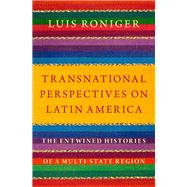Transnational Perspectives on Latin America The Entwined Histories of a Multi-State Region
, by Roniger, Luis- ISBN: 9780197605318 | 0197605311
- Cover: Hardcover
- Copyright: 12/7/2021
Latin America is a region made up of multiple states and societies with a diversity of races, ethnicities, and cultures. These states share historical legacies, cultural backgrounds and institutional frameworks, as well as political and socioeconomic challenges--but can one say they share a "regional perspective," if such perspectives even exist?
In Transnational Perspectives on Latin America, Luis Roniger argues that the notion of Latin America is significant for understanding these societies' multiple connections and spillover across state boundaries. He claims that cross-border networks, a protracted concern and at times involvement in the affairs of neighboring states have shaped the region's modern character as much as the process of nation-state formation. Geopolitical, sociological, and cultural trends molded a contiguity of influences, leading sometimes to state confrontations, but overall, shaping a transnational arena of connected histories, interactions, and visions, complementing the process of separate nation-state formation.
The book offers fresh readings of the dynamics of this region of multiple societies that have shared historical and cultural connections and developed divergent paths while unable to fully disengage from one another. Its chapters analyze persisting forms of circulation and articulation of networks, practices and ideas crossing international borders. Among the topics covered are political exile; the interface of state building and transnationalism; wars and the diffusion of conspiracy theories; the transnational imprint of the Cold War and democratization; social movements and transnational solidarity; states' geopolitical shifts and their impact on Jewish and Muslim citizens. The book closes with a chapter on twenty-first century dilemmas and challenges, including the process of segmented regional integration, state accountability, the vitality and limits of citizenship regimes, and pandemic politics.
In Transnational Perspectives on Latin America, Luis Roniger argues that the notion of Latin America is significant for understanding these societies' multiple connections and spillover across state boundaries. He claims that cross-border networks, a protracted concern and at times involvement in the affairs of neighboring states have shaped the region's modern character as much as the process of nation-state formation. Geopolitical, sociological, and cultural trends molded a contiguity of influences, leading sometimes to state confrontations, but overall, shaping a transnational arena of connected histories, interactions, and visions, complementing the process of separate nation-state formation.
The book offers fresh readings of the dynamics of this region of multiple societies that have shared historical and cultural connections and developed divergent paths while unable to fully disengage from one another. Its chapters analyze persisting forms of circulation and articulation of networks, practices and ideas crossing international borders. Among the topics covered are political exile; the interface of state building and transnationalism; wars and the diffusion of conspiracy theories; the transnational imprint of the Cold War and democratization; social movements and transnational solidarity; states' geopolitical shifts and their impact on Jewish and Muslim citizens. The book closes with a chapter on twenty-first century dilemmas and challenges, including the process of segmented regional integration, state accountability, the vitality and limits of citizenship regimes, and pandemic politics.






